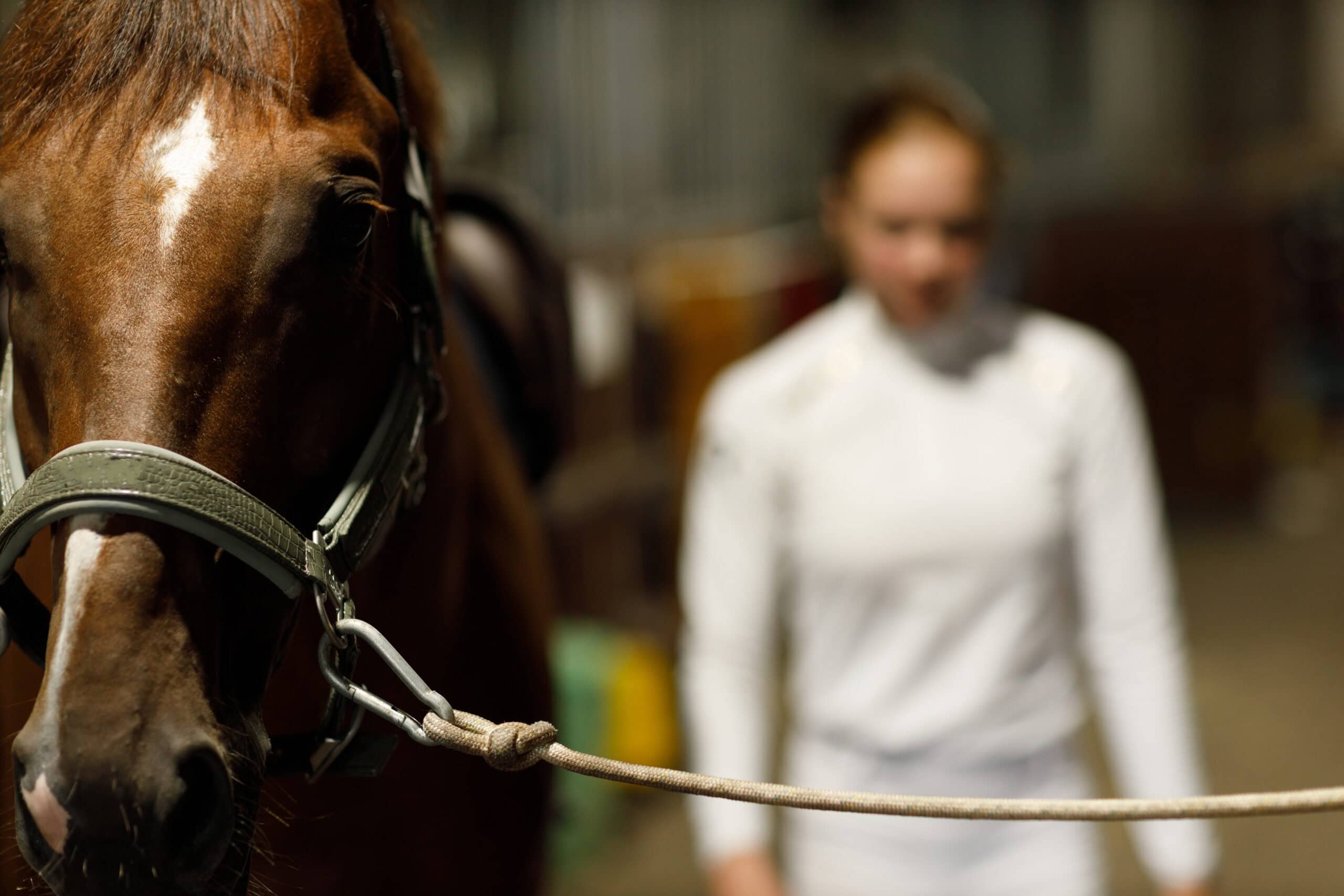I Bought a Horse With a Behavior Problem!
Does your new horse have behavioral problem the seller didn't disclose? Here's what to do.


By Rachel Kosmal McCart
Equine Legal Solutions frequently helps unhappy horse buyers decide whether they have a viable legal case against the seller, and if they do, whether she is the right attorney to represent them. Here is what we look for during initial consultations.
Did the Buyer Try the Horse Before Buying It?
If the buyer tried the horse out before buying it, noticed the behavior problem and bought the horse anyway, the buyer probably doesn’t have a viable legal claim against the seller. This is true even if the seller offers speculation about the cause of the behavior problem, such as, “I think he bucks because of an old saddle fit issue” (that is, unless the seller knows exactly why the horse bucks and deliberately lies to the buyer about it).
Does the Horse Actually Have a Behavior Problem?
To have a viable legal case against the seller, the buyer must be able to show that the horse does, in fact, have a behavior problem, and it’s serious. Serious behavior problems might include bucking, rearing, bolting, biting, kicking and any other habitual behavior that is unreasonably dangerous for the horse’s rider or handler. However, there are many possible explanations for bad horse behavior. For example, even very well-broke, been-there-done-that horses will often test a new owner to see what the he or she will tolerate. A horse, especially a green horse that hasn’t been very many places, will often be more energetic, spookier and more nervous than it was when the buyer tried it at the seller’s place. If the buyer changes the horse’s diet or exercise, the horse might be more (or less) energetic and cooperative in its new home. Discomfort, such as an ill-fitting saddle, can cause the horse to act out. The buyer should be prepared to have a professional trainer evaluate the horse and give a professional opinion that the horse does, in fact, have a serious habitual behavior problem that isn’t being caused by his new environment.
Can We Prove the Behavior Problem Existed Prior to the Sale?
To have a viable legal case, the buyer must be able to prove the horse had the behavior problem before the buyer bought it. Often, tracking down the horse’s previous owners and trainers is the best way to uncover evidence that the horse’s behavior problem is long-standing. Registration papers often list previous owners’ names and city/state of residence, and from there, a simple search on a site like WhitePages.com or Intelius.com can yield complete contact information for the previous owners. Previous owners sometimes provide very helpful information, such as the horse’s behavior problem being the very reason they sold the horse. If the seller kept the horse at a boarding stable, a call to the stable manager might yield some information about the horse’s behavior while it was there. If the seller competed with the horse on a particular circuit, the buyer might find useful information by attending the next circuit event and asking around about the horse. Depending on the nature of the behavior problem, the seller’s vet or farrier might be able to provide useful information
Is the Seller a Professional?
Is the seller someone who sells horses as part of their business, such as a trainer or breeder, or they an individual horse owner who sells a horse only occasionally? If the seller is a professional, the sale might be subject to the Uniform Commercial Code, which provides that a warranty of “merchantability” is implied in every sale by a “merchant.” In laymen’s terms, this means when a breeder or trainer sells a horse, there is an implied term that the horse has no serious habitual behavior problems. No warranties are implied in sales by individuals. The implied warranty of merchantability can be overcome by a specific statement in the sale contract disclaiming this warranty. Note, however, that contract statements such as “As is, no warranties,” or “seller disclaims all warranties” are insufficient to successfully disclaim the warranty of merchantability — the word “merchantability” must be specifically mentioned in the contract disclaimer.
Did the Seller Know the Horse Had a Behavior Problem?
If the seller isn’t a “merchant,” to have a viable legal case, the buyer must be able to prove that not only did the horse have the behavior problem prior to purchase, but also that the seller knew the horse had the behavior problem. This is another area in which the horse’s previous owners and trainers can provide valuable evidence — perhaps the person who sold the horse to the seller kept the email correspondence where they disclosed the behavior problem, or they had a bill of sale that specifically noted the behavior problem. People who witnessed the horse exhibiting the behavior problem with the seller can also provide valuable testimony.
Did the Seller Disclose the Behavior Problem?
If the seller disclosed the behavior problem to the buyer, the buyer probably won’t have a viable legal case against the seller. For example, if the horse’s behavior problem is that it bites when its girth is tightened, and seller told the buyer the horse is “cinchy,” the buyer would have had a legal duty to investigate and ask the buyer exactly what that means — i.e., what does the horse do when you tighten his girth?
What Does the Contract Say?
First and foremost, does the sale contract say anything about the horse’s behavior problem? If it discloses the behavior problem, the buyer probably won’t have a viable legal case. As discussed above, the contract can successfully disclaim the warranty of merchantability and other warranties. However, an “as is” clause can’t overcome actual fraud — such as if the seller knew the horse was a dangerous bucker and represented it as “kid safe,” etc. Does the contract have a return policy? If so, did the buyer follow the steps required to return the horse?
What Did the Ad Say?
Did the seller make any specific statements in the advertisement for the horse about the horse’s temperament or suitability for a particular purpose? If so, these statements could form the basis for a warranty claim against the seller. For example, if the seller advertised the horse as an “excellent trail horse,” that would form the basis of a claim that the seller warranted the horse was suitable for use as a trail horse. Note, however, that warranties of fitness for a particular purpose and other warranties can be successfully disclaimed by contract language.
I Think I Have a Case, Now What?
So let’s say the horse has a serious behavior problem, had the behavior problem before you bought him and you can prove the seller knew it. Does it make sense to sue the seller? In addition to the factors to consider when evaluating any equine legal case, here are some considerations specific to horse purchase cases:
- Small claims courts don’t have the power to require the seller to take the horse back. They can only award money damages and only up to the small claims limit.
- What are your damages? Your damages are not only what you paid for the horse, but also what it has cost you to keep it and try to deal with the behavior problem, such as seeking assistance from a professional trainer. At the same time, you have a duty to mitigate your damages, so you must minimize the costs involved in caring for the horse. You will need to balance your damages against the likely cost of litigation and the likelihood of being able to collect from the defendants, as well as consider whether your case includes a legal claim for attorneys’ fees and costs.
- If the horse has such a severe behavior problem that he is dangerous to keep around, keep in mind that if you sue, the horse will be crucial evidence in your case and cannot be euthanized until the defendants’ experts have had a chance to examine him. And the defendants won’t be in a hurry to spend money to have their experts examine him. They’ll wait as long as they can, and you can count on it being months.
- If you resell the horse, your damages are reduced by the amount you received for the horse. Plus, the horse is crucial evidence in your case, so if you sell him or give him away, you will need to make sure you have access to him during the litigation.
This article is for general information purposes only and is not a substitute for one-on-one legal advice about the merits of your particular case. If you live in California, New York, Oregon, or Washington, or your case involves one of these states, please contact us for a consultation. If you live in another state or province, please see our equine attorney directory for referrals to an attorney in your area.
Share this article

Written by: Rachel Kosmal McCart
Rachel Kosmal McCart is a lifelong horsewoman and the founder of Equine Legal Solutions, PC, an equine law firm based in the Portland, Oregon area. Rachel is a member of the New York, California, Oregon and Washington State bars and is admitted to practice before the U.S. District Court for the District of Oregon and the U.S. District Court for the Central District of California. Rachel currently competes in three-day eventing.








